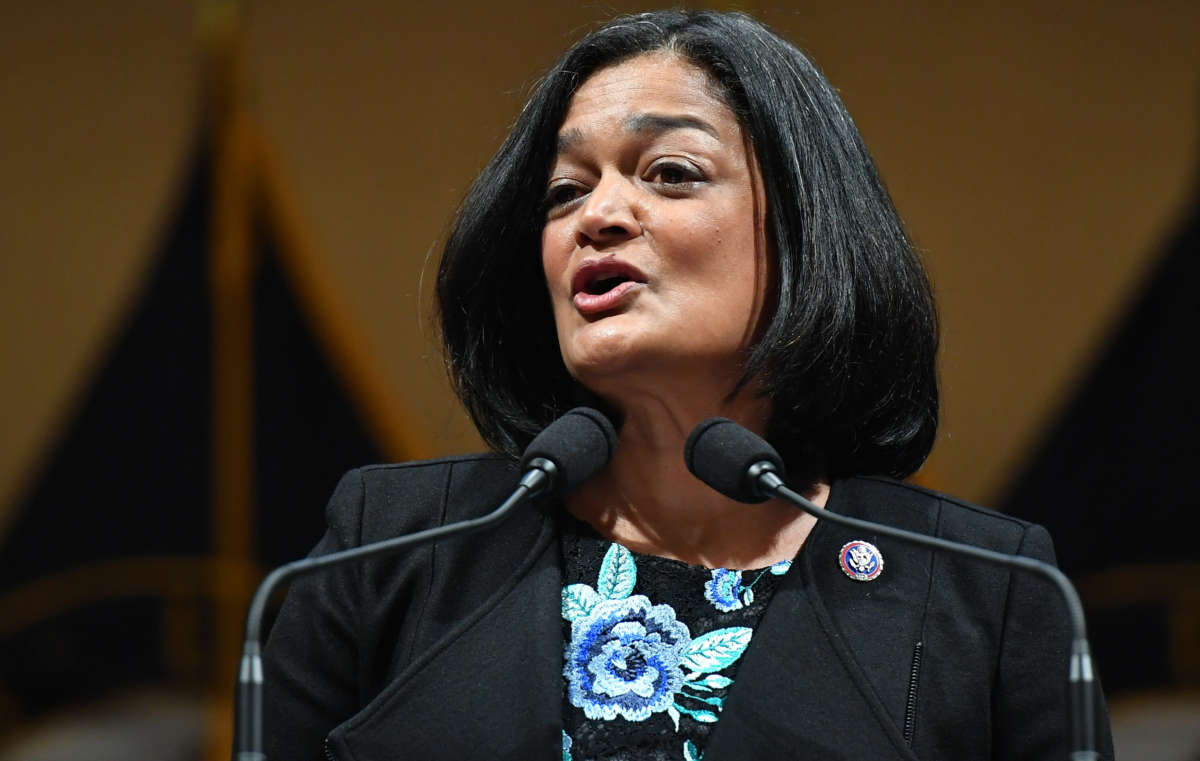Honest, paywall-free news is rare. Please support our boldly independent journalism with a donation of any size.
A bill that would establish Medicare for All in the U.S. has reached 120 sponsors, Congressional Progressive Caucus chair Rep. Pramila Jayapal (D-Washington) announced on Sunday.
“We’ve officially got a record 120 co-sponsors on my Medicare for All Act!” said Jayapal, who introduced the legislation. “Thrilled to welcome Rep. Sheila Cherfilus-McCormick (D-Florida) to our fight to ensure health care as a human right!”
Signing on to the bill as a cosponsor is one of Cherfilus-McCormick’s first acts since being sworn in as a member of Congress in mid-January. Last week, Representatives Donald Norcross (D-New Jersey) and Shontel Brown (D-Ohio) also became cosponsors of the bill; original cosponsors include progressive “squad” members like Representatives Alexandria Ocasio-Cortez (D-New York), Ayanna Pressley (D-Massachusetts) and Ilhan Omar (D-Minnesota).
The Medicare for All Act of 2021, or H.R. 1976, would establish a single-payer healthcare system in the U.S. Under the bill, health care claims would be paid by the government and all U.S. residents would be able to access health care without having to pay out of pocket for most services.
Jayapal’s bill would establish a more generous plan than in countries like Canada, where the single-payer health care system doesn’t cover vital services like vision, dental or prescriptions. H.R. 1976 includes those benefits as well as long-term nursing and rehabilitative services.
For years, Medicare for All has been a rallying cry for progressives across the country, popularized by Sen. Bernie Sanders (I-Vermont) during his 2016 presidential run. Some experts have pointed out that the original idea behind the Medicare program was for all residents to have access to health care, not just a few.
“We mean a complete transformation of our health care system and we mean a system where there are no private insurance companies that provide these core benefits,” Jayapal said when she introduced the bill last March. “We mean universal care, everybody in, nobody out.”
Though the bill is unlikely to pass Congress, the record number of cosponsors suggests that pushes for Medicare for All are gaining momentum as progressives in the House are growing in number.
When Jayapal originally introduced the bill, it had only 112 cosponsors; when she introduced it in the last Congress, it only had 106 original cosponsors. In 2019, Sanders introduced a Medicare for All bill in the Senate with 14 cosponsors. He has not reintroduced the bill in this Congress.
“In my view, the current debate over Medicare for All really has nothing to do with health care. It’s all about greed and profiteering. It is about whether we maintain a dysfunctional system which allows the top five health insurance companies to make over $20 billion in profits last year,” Sanders said in 2019. These profits have only multiplied since the start of the pandemic.
Polling has found that a majority of Americans favor proposals for Medicare for All. But while the idea has gained some steam in Congress over the past years, it still faces fierce opposition from lobbyists and the lawmakers they solicit.
Private health insurers are making record profits while insuring fewer people; reports have found that the U.S.’s health expenditures are the highest among member countries of the Organisation for Economic Co-Operation and Development (OECD), while the U.S.’s health care system ranks last on measures like access, efficiency, equity and health outcomes. Meanwhile, pharmaceutical companies are hugely reliant on profits generated by U.S. citizens, and a report last year found that prices for top prescription drugs are as much as 10 times higher in the U.S. than they are in other countries.
Lobbyists, looking to maintain these profits, play a huge role in the legislative equation – according to Politico, the health care industry lobby has created an “army” to fight Medicare for All in Congress, developing cozy relationships with Democrats and Republicans alike. Last year, health insurance and pharmaceutical lobbyists maxed out their donations to Democrats as they were crafting the Build Back Better Act, which included proposals that took aim at sky-high prescription drug prices.
Press freedom is under attack
As Trump cracks down on political speech, independent media is increasingly necessary.
Truthout produces reporting you won’t see in the mainstream: journalism from the frontlines of global conflict, interviews with grassroots movement leaders, high-quality legal analysis and more.
Our work is possible thanks to reader support. Help Truthout catalyze change and social justice — make a tax-deductible monthly or one-time donation today.
